Theatre Reviews
DON JUAN - The REC Theatre Company
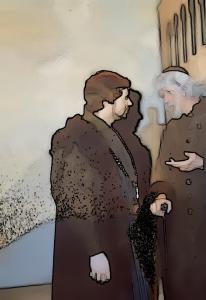
On the last night of the Fringe a figure in a long brocade coat strides onto the stage at the High Peak Bookstore and Café. He is Don Juan and is here to tell us the tale of his adventures, and misadventures, in the pursuit of lust, and ultimately, love. We meet figures from his life, who are mostly expressing their displeasure with Don Juan in a variety of impeccable but unlikely accents. Throughout, Don Juan remains unrepentant, seemingly unable to contain his appetites and proud of his ability to lie and scheme to get his desires. He is also a notable swordsman.
Martin Beard, who wrote this one-man piece and has performed it many times, skilfully summons up fifteenth century Spain and the cast of supporting characters on a stage containing only a table and chair. Along the way we are shipwrecked with none other than Cristobal Colon, and of course in Don Juan’s telling of the tale it is he who rescues Chris from drowning.
But in the end even Don Juan meets his comeuppance when he falls in love with a woman he can never have. We leave him, regretful but unrepentant to the end, condemned to a lonely existence with his only dinner companion the shadow of a statue of a man he killed.
Beard provides vivid insight into a work from the Spanish Golden Age. Unfortunately, Covid isolation requirements meant this was the only chance to meet Don Juan this year. This is the first year that High Peak Bookstore and Café have hosted Fringe events, and it’s an excellent venue, to which I hope the Fringe, and maybe even Don Juan, will return next year.
Georgina Blair
BATTLE CRY BY MATT FOX & STEVE COWLEY - Madam Renards
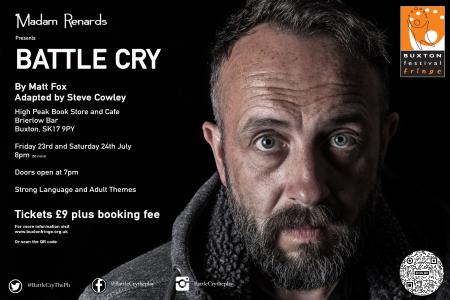
Battle Cry is the story of a soldier from new recruit to discharged veteran. It describes the highs and lows of soldiering. How being in the army provided extraordinary and exciting opportunities for Adam, a lad from Bingley, but also how it took its toll on his emotional well-being and left him with invisible injuries.
This play shows why men and women go into and remain in the army. It explains why the opportunities for travel and camaraderie can be irresistible and how the army itself becomes their family. However it also provides an insight into the traumatic demands of army life and the emotional toll of living with the visceral fear and the sometimes endless stream of dead bodies.
The play shows the bitter sweet aspects of military life. Deep friendships are made and lost for a variety of reasons. Warm connections are made with the local inhabitants from foreign countries but these do not always end well. There is a struggle with guilt when ordinary everyday decisions can have devastating consequences for the people around you.
The writer Matt Fox has created a vivid picture of military life based on his meticulous research. The actor Steve Crowley's performance is mesmerising and totally believable.
Alex Watts
THE BUS STOP - Empress Presents

How do you feel when a complete stranger starts a conversation with you at the bus stop? Then how do you feel when that stranger is not satisfied with pleasantries about the weather or the lateness about the bus and starts telling you about their life? This is the starting point for Margaret Holbrook's heartwarming play that explores the joys and heartaches in the lives of two very different young people.
Keith is lonely and paints a rosy picture of his life to distract himself from a history of loss and rejection. Jackie is kind and cheerful but feels inadequate and unfulfilled in her job and her personal life despite being surrounded by loving family. These are characters that we all know and who pass through our lives from time to time.
This is a play about the everyday encounters that enrich our lives and the positive effect of sharing our stories and encouraging others to tell theirs. Like many good writers, Margaret Holbrook captures the musicality and poetry of everyday speech, "shoe shopping, shopping for shoes", "coal and water, god's gifts come from everywhere", "the shop was a palace and he was the king".
There was a well attended Q & A session after the performance. This highlighted how much the audience had enjoyed the play and had been charmed by the performances of Keith and Jackie. The play ends with the characters parting when a bus arrives and this leaves you wondering whether the other person ever intended to catch a bus at all. Some of the audience praised the author for avoiding the temptation to introduce a more dramatic twist at the end. I think that the play has the potential to have multiple endings in the style of Alan Ackbourn in order to introduce the possibility of several different futures for these endearing characters.
Alex Watts
ROMEO & JULIET: THE CONFESSIONS - inamoment theatre

Take Romeo and Juliet (well, Juliet – Romeo is dead) and create a situation where you will see things from a new point of view. ‘Inamoment Theatre’ does this and reveals the perspectives of the Friar and the Nurse. We also get the thoughts of Juliet when she learns of Romeo’s death.
Curiously there are no original Shakespeare productions, apart from the greatest hits by the regular Street ‘Jukebox’, at this year’s Fringe, but this is the second ‘speculative’ show with ‘After Shakespeare’ being the first.
There are critics who disapprove of ‘mucking about with Shakespeare’ but giving a new and fresh insight to a familiar play can enrich appreciation of the original. It is also undeniable that whatever liberties are taken in the short term the Bard’s work will endure.
The play begins with the nurse discovering the unresponsive Juliet believing her dead, and moves to the Friar’s remorse (Alex Nikitas) at having aided Juilet’s apparent suicide by providing her with the potion she took to feign death and avoid a forced marriage to Paris. He laments the chain of events following his actions but excuses himself by claiming Juliet was on the brink of suicide if he had refused. A prophetic statement.
The nurse’s contribution (Gerry Johnson) is mainly directed toward reminiscences of her own child and Juliet as two peas in a pod, her love for them was equal she declares, and her descriptions round out the character of Juliet who, we sometimes forget, was merely 13 years old.
Then we have Juliet (Natalie Lewis) who is overwhelmed by the events following her taking the potion. Her contribution is made more emotional as it takes place over the body of Romeo.
The story was told from each participants point of view and despite little interaction between them the continuity was good and the cast were intense and convincing throughout.
I was assured that two thirds of the dialogue is Shakespeare’s even if selection and sequencing was subject to ‘modification’. Hence we get Juliet’s most famous lines, “Romeo, Romeo wherefore art thou Romeo” spoken over his corpse, which I think works just as well.
If you have even a passing acquaintance with the original and would be interested to see a well performed and different take on the ending then this show is highly recommended.
Further performances 23rd and 24th July.
Brian Kirman
WITHOUT MALICE OR ILL WILL - Hand On The Tap
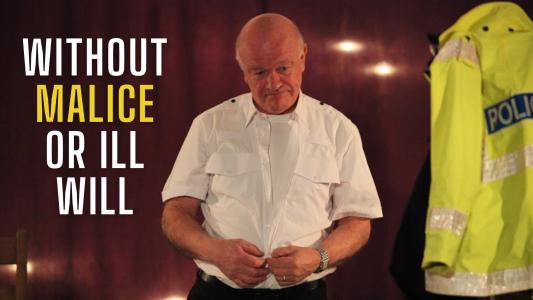
Using the police to carry out a political agenda? This must be a third world country. Eastern European post-communist state? Maybe. It couldn’t happen here, could it?
Ray Castleton in the guise of ‘Geoff Marsh’ presents a show which is mostly about his time in the West Yorkshire Police Force. He leads us through a whimsical reminiscence of his time after leaving school: meeting a girl and following his family ‘down the pit’; just an ordinary working class lad. But after nine years and following the success of the miners’ strike which, helped bring Ted Heath’s government down, he is persuaded to join the Police and become a ‘Community Bobby’ just like his uncle. All goes well until the second miners strike which this time was not about pay and conditions but about the survival of the coal mining industry.
The strike, as ‘Geoff’ describes it, was at first was good humoured but the determination of the strikers was matched by the iron fist of Margaret Thatcher who had a score to settle with the miners and the strike develops into a protracted political battle.
The defining moment of the conflict was the Battle of Orgreave where, Geoff suggests that the army was brought in wearing police uniforms. Police were also drafted in from forces from around the country, notably the Metropolitan Force from London, where the police had no empathy with the miners’ struggles; no relation to the community. They were brutal, violent and provocative as they repressed the strikers. Margaret Thatcher had her revenge.
Geoff explains the tactics of the police – which seems to be an early form of ‘kettling’ and he doesn’t hide his emotions which are still deeply felt almost 40 years later.
He concludes his powerful story with a more recent memory which shows local resentment against the police has endured decades later.
A further note:
Ninety five miners were charged with various offences on that day but all 95 were dropped as allegations emerged that the police had fabricated their evidence. There were also suggestions that had there been an inquiry into the confrontational policing methods then the Hillsborough tragedy five years later could have been avoided.
After much effort by the Orgreave Campaign for Truth and Justice, Amber Rudd, then Home Secretary, in 2016 refused to allow a public inquiry into that day in 1984 stating that, ‘...well nobody died’. This in spite of her predecessor, Theresa May’s insistence that, ‘Historic inquiries are necessary to deliver justice’.
An important episode in working class history related by powerful performance that had the audience gripped from the start.
Further shows: 21st and 23rd July.
Brian Kirman
CROOKED SPIRE MURDER MYSTERY MUSICAL (WINDLASS EDITION) - Ashgate Heritage Arts
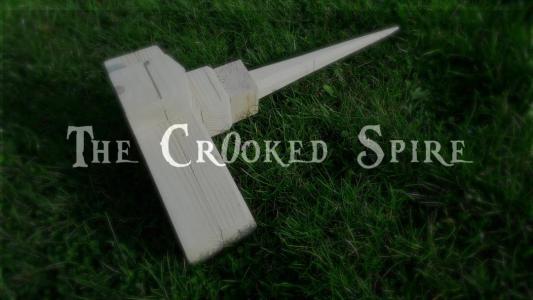
Chesterfield based Ashgate Heritage Arts is run by Peter Gray, Martin Coslett and Mary Hennessy-Berrisford, and includes members of the local community to bring their projects to life through workshops and performances. A firm favourite at Buxton Festival Fringe, the collaborative has recently adapted Chris Nickson’s book ‘The Crooked Spire’ into a musical (Windlass Edition) for your online viewing pleasure.
Set in post plague 1360 we meet a recently orphaned John Carpenter, so called because of his father’s trade, arriving in Chesterfield to make a fresh start armed with only his inherited carpentry tools. He finds work erecting the [crooked] spire of the new church, but within hours finds the body of his murdered supervisor. In the frame as a suspect John must prove his innocence by joining forces with the coroner to track down the real killer. Making formidable enemies along the way the body count continues to rise and it’s a race against time for John to solve the mystery and keep his friends safe in the process.
Filmed in isolation with some clever editing this outstanding acting talent blends with uplifting and comedic musical elements, which stop things feeling too serious. Look out for an hilarious wistful duet by our narrator, and John’s landlady, Martha with Robert the clergyman.
It would be great to see the full length version on the big stage at the Buxton Opera House.
Karen Wain-Pimlott
BUTTERCUP BY PATRICIA DOWNEY - Spanner In The Works Theatre Company
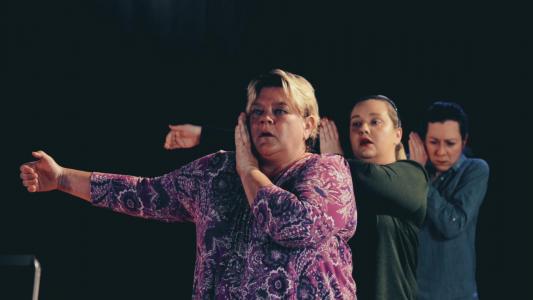
Buttercup is the story of three women, Katie, Colleen and Mary, growing up in Anderstonstown in west Belfast through the Troubles and to the present day. It is a story of female strength, loyalty and friendship in changing times.
Patricia Downey’s play is carefully and movingly constructed. We first meet the three friends, dancing to the hits of the time at teenage discos. All three marry at 21. All three have children. We see them interact together, but we also get windows into their individual stories. The girl rebelling against a father made overprotective by his time being tortured by paramilitaries. The woman in a loveless marriage finding hope of romance from the Pick ‘n’ Mix salesman at her Woolworths store. The mother maddened by grief following the unthinkable death of her daughter.
The ensemble cast – Claire Cogan, Caroline Curran and Hannah Carnegie – is universally excellent, playing the three central characters and also other people that cross their paths. The play is simply staged, and the changes between the characters conveyed with skill and economy. They play the three women from the 1970s to the present day, and due to the writing and direction of Patricia Downey, the audience’s acceptance of this never flags. We understand that the three women carrying a coffin at the end are the same ones dancing to Showaddywaddy and David Soul at the beginning – women we have come to care deeply about through the course of the play.
Ultimately this is a play about resilience. Although dealing with big emotional subject matter, it remains as clear-headed and unsentimental as the characters it presents. Buttercup is powerful, moving and yet hopeful and a terrific piece of theatre.
Robbie Carnegie
KES - Sudden Impulse Theatre Company

I came into this afternoon's performance of Kes with very high hopes and I can wholeheartedly say that Sudden Impulse Theatre Company did not disappoint with this brilliant show.
The film of Kes has been a favourite of my Dad's for years, so it was only fitting for us to sit on the front row at the Underground at the Old Clubhouse venue, both very intrigued to see how they would bring Kes to the stage! The story of Kes is a touching tale of a deprived boy who finds meaning to his life through a kestrel that he dutifully cares for and devotes everything to.
Billy (Daniel Gentles) and 'The Man' (Nathan Harvey) collaborated to dynamically bring to life different characters utilising the props to change the settings and situations. The storyline remained very true to the film, down to the PE teacher playing Bobby Charlton in the football game! The way they portrayed the bird, Kes, was very captivating, cleverly using choreography and the body language of the actors and encouraging the audience to use their imagination.
A wonderful and heartbreaking performance for anyone, whether you know the story of Kes or not! You can watch the show at Underground at the Old Clubhouse 20th-23rd at 2:30-3:30pm and 19th July at 7-8pm.
Alice Featherstone
THE VIRTUOUS BURGLAR - Sudden Impulse Theatre Company

With 18 months of pandemic behind us – or so we hope, all theatres and performance spaces closed, it’s such a pleasure to see a play with a large cast and with a bit more scenery, reminiscent of Feydeau and even the well-known Whitehall farces. 7 performers here, popping variously in and out of doors and windows, not to mention the grandfather clock which takes pride of place on stage. Regular Buxton Fringe visitors Sudden Impulse Theatre Company, based in Nuneaton, have chosen Dario Fo’s 1958 classic farce as one of this year’s productions.
Fo was a prolific writer (well over 30 plays) and director: much of his work was political, some activist, but this is none of that: it’s based on the typical set of misunderstandings, role reversal, unexpected arrivals, verbal sharpness: and then, in the last minutes, the frenzied 'business' of chasing round the furniture. Again, and again. Oh and yes, there IS a trouser-dropping scene which leads to visual gags as that character finds himself hobbled with his trousers round his ankles.
To be sure, the play is very much of its time, a style of theatre which is largely gone except as a matter of theatrical record. But here it is presented with unflagging energy and enjoyment, played upfront and without a great deal of subtlety, to (on the First Night) an audience full to capacity and where some, especially in the front row, were laughing fit to bust.
If you don’t know the play, it’s a good introduction to this kind of farce: no ‘message’, no significance other than simple enjoyment, not such a bad thing on a warm summer evening.
Michael Quine
FOR I HAVE SINNED - Qweerdog Theatre

For I Have Sinned has a classic set-up as a man enters an empty church for his first confession in many years, to meet a self-satisfied priest, confident in his importance and in his role in the community.
An instant sense of unease between the men is cleverly conveyed as the man takes his place in the confessional, startling the priest when he returns to his side of the booth, expecting to settle down to his Sudoku. The audience knows that secrets will emerge, and as the man’s confession takes shape over two sessions the relations between them shift as truths form from an incident stretching 40 years into the past.
Shaun Hennessy, who also wrote the play, brings a physicality as the Man, able to shift at ease between questioning and confused to a simmering sense of menace, and when he did burst into anger it was genuinely shocking, though at times his lines seemed to be a little too formal for his earthy persona. The Priest (William Teller) was the perfect foil, calm and urbane, with a voice just right for the priesthood.
The blue room at the URC is not perhaps the first choice for theatre, but it works well for intimate drama like this, though better for the second scene, the ostensibly more casual face-to-face meeting than for the initial confession scene. The actors also made good use of the room, for example, by checking out of the curtains to see if anyone was around.
It is always good to see new plays at the Fringe, and this is a solid contribution, if a little long and wordy. The plot perhaps needs more surprise in its twists for audiences grown more sophisticated on a diet of Nordic Noir and Line of Duty.
Stephen Walker
JEKYLL & HYDE: A ONE-WOMAN SHOW - Sweet Productions

This production, arriving in Buxton from powerful reviews at the Brighton Fringe, taps (or, better) mines a very rich vein. Robert Louis Stevenson’s classic novella 1886 novella has 8 or so characters, focussing on the personalities of the two men: this one-woman adaptation, development, of the original largely evades the masculine and leaves us in a context where heightened emotion and sensuality are seen and shown as male and female, perhaps both, perhaps neither, but for sure adding a welcome depth.
Heather-Rose Andrews inhabits both Jekyll and Hyde while also serving as narrator, telling us about, and as the piece develops showing us, the tensions building in the main characters. The persuasive early scenes give us a tantalising series of episodes as Jekyll – using the then-modern technology of the scratchy cylinder phonograph – drives forward the learning and development of alter-ego Hyde. The two different personalities are well contrasted and we see Hyde accepting then rebelling: reaching towards a powerful sensual climax of self-discovery.
This is not the ‘story’ as we might know it but a fascinating interpretation of it. The script and the performance give us dark insights into that Victorian age, into the search for knowledge and understanding of the intellectual Edinburgh of the time, and into some of the horrors of the time whether in Stevenson’s native Edinburgh or in the Gothic London with its murders and stretched approach to morality. From that start, the duality of the two personalities is powerfully portrayed with abundant energy as the two intertwine and the weakening serum leads to the inevitable conclusion.
Written and directed by J.D.Henshaw, the show is presented with just enough on stage to set the context and the use of the phonograph recording adds significantly to the slowly-developing sense of horror. The piece as a whole is thoughtful, adventurous, and challenging.
Michael Quine
NAUGHTY BOY - Eddy Brimson
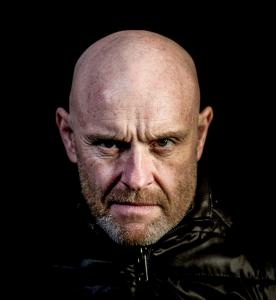
Naughty Boy is written and performed by Eddy Brimson and is playing on the stage in the brilliant Green Man Gallery.
The piece starts with the character seated and dressed head to toe in white in silence, but he is in no way pure, innocent or reserved. We find Joe in a psychiatric hospital, engaging, sharp and very observant. Joe thinks he is playing the system and that everyone thinks he is wonderful. He is calm and calculating, a worryingly rational manipulator.
This was a powerful monologue delivered with skill and conviction by Eddy, who has intimate insight into football hooliganism having experienced it from the inside and was thus able to fully inhabit this cold, rational and truly vile character. His delivery thorough out was captivating. He drags you on an unpleasant journey through moments of his life and onwards to Blackpool.
The character he portrays is simply put an awful person. But it is fascinating the way that Joe rationalises his behaviours at every turn in an attempt to make his audience see a normality in what he is saying and doing.
The piece is bleak and nasty and disturbing. However, Eddy somehow makes this extremely watchable!
Jayne Marling
A LADY OF LETTERS - Chapel-en-le-Frith Players
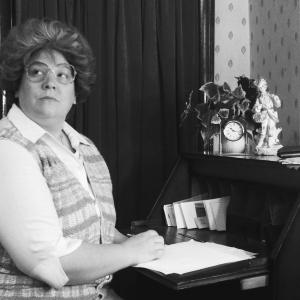
A Lady of Letters is Chapel Players’ first visit to the Fringe. Faced with the ever-changing challenges of theatre in the time of Covid, they have chosen to revive their popular production from four years ago, with Helen Bates reprising her role as Miss Irene Ruddock in Alan Bennett’s classic monologue.
We meet Miss Ruddock as she returns home from attending a crematorium ceremony for somebody she knew only from shared bus journeys. Helen skilfully captures Irene’s defensive busyness as she takes us through her voluminous correspondence, telling us with true glee that she’s had ‘a card from the optician’s this morning.’ As the piece progresses we become aware of Irene’s loneliness, and her inability to engage with the world around her.
The audience chuckled appreciatively at the many humorous asides, but you could have heard a pin drop when Irene faced the reality of her situation. Written in 1988 this piece still resonates today, as when Irene says frustratedly ‘I don’t know who you write to about doctors.’
Chapel Players are used to the comforts of their own playhouse, but adapted well to the corner stage in the Green Man Gallery. When director Stephen Kettle ended up in A&E on the morning of the performance, due to a mishap whilst bathing, Helen’s husband was rapidly drafted in to perform the set change which happens midway through the performance. He managed this with great aplomb despite having to do it all in full view of the audience.
Director Stephen is normally too busy marking exam papers at this time of year to take part in the Fringe, but afer this wonderful performance we hope Chapel Players will be back next year, even if exams return.
A Lady of Letters is on again on 16 July at 8.30pm and 18 July at 6.30pm but all performances are already sold out.
Georgina Blair
TOO YOUNG TO STAY IN, TOO OLD TO GO OUT! - Nigel Osner

You might think a show with a title like this would be a dead cert for the ‘mature’ mid-week Buxton audience, but the younger members of the audience appeared to enjoy the show just as much.
The theme of the show is humorously set by the first song which sets out the changing attitudes to going out and entertainment as we age. This is followed by various songs and monologues in different characters; male and female. These include: a fitness fanatic trying to regain his youth, Marlene Dietricht who unwisely worked longer than she should, an American ‘Cougar’ and a nice old lady who is revealed to have a dark side.
Nigel Osner (who also wrote the material) is an engaging character who had the audience on his side from the start. Perhaps the finale could be developed further, otherwise all good fun with sharp observations of how ageing changes us.
Further shows: 14th and 15th july.
Brian Kirman
AFTER SHAKESPEARE - Slade Wolfe Enterprises Limited
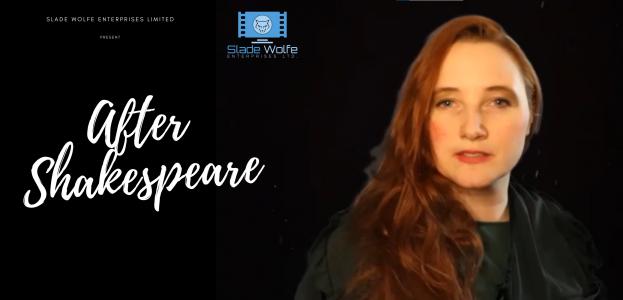
To write follow on dramas from Shakespeare’s plays is a bit limiting you might think as most of the main characters seem to die in the final acts. But Lexi Wolfe finds four characters from different plays whose stories she elaborates to provide fanciful but plausible successive narratives.
The hour long show is split evenly into four quarters and no introduction is given to each character so for the first few minutes the audience is left to deduce the play and the character.
Without giving anything away I can say the presentation includes: a king, a queen, a prince and a cross-dressing lawyer.
Lexi is very convincing in all parts with minimal costume changes and held the audience throughout. It was a reversal of normal theatre experience where all in the room were wearing masks except the performer. Nonetheless a welcome return to live theatre.
This strongest section was the description of the siege of Rouen where 12,000 people were ejected from the city to save food for the military and the refusal of the English king to allow them safe passage. Lexi reflects on the conscience of the king as he watches them starve and die in the dry moat; rejected by both English and French kings – almost a parallel for present day asylum seekers?
This is not a Shakespearean drama as such, but a speculation on how the protagonists could have developed and as such doesn’t require an intimate knowledge of the plays but a passing acquaintance helps.
Further performances on: 13th, 14th and 15th July.
Brian Kirman
HOW TO THINK THE UNTHINKABLE BY RYAN CRAIG - REC Youth Theatre Company's Senior Company

The REC youth theatre in all its various age groups has been, like so much theatre, on hold for the last 16 months, so it was a pleasure to see its Senior Company return to the stage with Ryan Craig’s How to Think the Unthinkable.
The play is a modern retelling of Sophocles’ Antigone. In the aftermath of a bloody civil war, Creon (Oliver Moody) has taken the throne of Thebes. A weak man determined to be seen as a strong ruler, he brings in a tyrannical law which puts him at odds with Antigone, his son's fiancée, leading to terrible consequences.
Kitty Randle’s production is simply staged, making a virtue of social distancing (to which the REC adhered admirably, creating a safe space for cast and audience alike). The occasional use of face masks by the cast makes a stark visual representation of a police state (and possibly draws parallels with the masks of Ancient Greek tragedy), although at times they do hamper diction.
In the title role, Emma Garde brings sensitivity and quiet determination to the role of the principled young woman, contrasted well by the more pragmatic, compromising stance of her sister Ismene (a fiery performance from Lydia Howard). Creon’s wife, Eurydice is considerably expanded as a character for modern audiences, played by Molly Cartwright as a real power behind the throne.
In the main change from Sophocles’ original text, however, Craig’s play puts at the centre of the action Tom, the hapless sentry who originally guards the body, and whose actions ultimately lead to the bloody tragedy that befalls the characters. It is a role that moves from comedy to tragedy and requires an actor of considerable nuance, which it gets here in the assured presence of Elyse Marling.
As with most companies this year, the REC’s senior company have had to work against the odds to stage a play, and have come up with a finished result that is powerful and striking.
Robbie Carnegie
BRIGHT. YOUNG. THINGS. BY GEORGINA CHRISTOU - REC Youth Theatre Company's Junior Company

Overheard in the car park after the performance has finished, “That was really good. So cool!”
And I would like to add it was also professional, slick, fun, joyous and a wonderful welcome back to live theatre from the REC Company.
Prior to the performance, Kitty Randle, one of REC’s directors, apologised for the fact that there had been several last minute changes due to cast having to self-isolate. Not a problem for this company, many of whom have been working together for a number of years. The production was seamless. Team spirit and confidence shone through. In a lovely touch, the programme notes gave the names of the actors who had originally been cast into the roles as well as the names of those performing.
The play, Bright Young Things, tells the story of 6 youngsters taking part in a television show in order to be awarded the title of “Brightest Young Thing”. Think every quiz show you have ever seen with over-excited hosts and contestants trying to shine.
Running through the play is the story of Rochelle and her father and, as we learn more about each character, their back stories emerge as well: James who has a photographic memory but only wants to be a Broadway star; the twins who seem to be so close but are they happy? Then Harriet, wealthy and seemingly self-confident and the multi-talented Amber. They all seem to worry about friendship and whether people like them. They all suffer from the pressure that comes from being a high achiever. Into this mix comes Rochelle, just an ordinary girl. A very good subject choice for this young company. All characters were portrayed with empathy and understanding.
Contrasting with the teenagers and their problems were the jaded adults. The presenters, the harassed assistant and the TV producers, manipulating and creating illusions. As one of them explained the quiz had nothing to do with real intelligence, it was a casting process guaranteed to give the audience what they wanted – and they don’t want real.
All the acting was of a high standard. Of special note was the way groups worked together - the two sunglass-wearing producers capturing the exasperated media type voices so well, the two presenters bounding onto the stage full of smiles, the caring relationship between Rochelle and her dad and the interactions between all the contestants.
The set was pared back to chairs and a “stage”. Whether doing a company dance number or performing as individuals the actors moved around the stage with confidence. Dancing and acting were well choreographed, which is a remarkable achievement given the current restrictions.
At the end of the play, one of the other characters says of Rochelle, “You took your own story and you owned it”. This play was a story of the youngsters, and adults, taking their own stories and owning them, Rochelle acting as a catalyst for change.
The REC Company too, actors, technical support and the adults took their story and owned it. In spite of the Covid restrictions they were determined to get back onto the stage and entertain us. At the end of the performance Kitty said she was so proud of the company. Justifiably so and judging by the enormous grins on the faces of company and audience alike, everyone agreed.
Viv Marriott
PRISON OF THE MIND - Theatrical Awakening
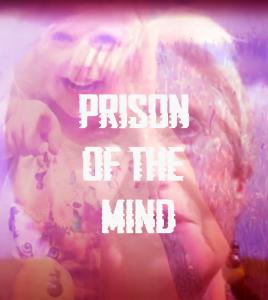
Two women sit cross-legged on either side of the stage. One, dressed in white, is a young girl, eagerly conjuring up her fantasies of flying in the sky with cuddly bunnies. The other, dressed in black, is a more mature woman, fighting with terrible memories of a stolen childhood. The two stay in these positions for much of the play, their emotions rendered in close up on a screen behind them.
This is the set-up for Prison of the Mind, an ambitious psycho-drama from Theatrical Awakening that delves into the terrible repercussions of childhood abuse. The two characters are clearly manifestations of the same woman – one her optimistic childhood self about to be betrayed in the worst possible way, one her 40-year-old self. Both have been incarcerated, whether literally or mentally, for the terrible act that they were driven to.
Prison of the Mind is the brainchild of actor-writer-director Charlie Brown, who plays the older iteration of the woman. She is joined onstage by Emily Bosworth, and both are to be praised for the commitment and intensity they bring to their roles. The play is at its strongest when they work in unison, with precisely timed dialogue and movement connecting the two unbreakably. If anything, I’d have liked to have seen more of this aspect of the production. The video projections of their faces (and the sepulchral off-stage voices that interrogate the two women) are powerful but ultimately take us away from the focus of the play, the actors themselves. Rather than bringing us closer in, they limit our connection to the performers. The short time when the actors are freed from their seated positions and able to move in tandem is electric and I’d have liked to have seen more of this.
Charlie Brown’s play is clearly a passion project for her, and she is to be praised for pushing the boundaries of what can be done in a fringe theatre setting. I look forward to seeing what she brings us next.
Robbie Carnegie
BUCKETS - haywire Theatre
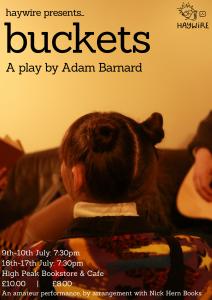
Haywire theatre is a shiny new theatre company founded by ex-York University students during the covid pandemic. They are a company brimming with enthusiasm and passion. They are newcomers to Buxton Fringe and deserve excellent audiences for their well crafted work. This is their first live performance and Buckets, Adam Barnard’s first full length play written in 2015 explores relationships, life, connections and moments in a play that boasts over 30 short scenes.
Director Olivia Clarke brought this piece to life eliciting some great performances from her actors. She times moments of comedy so clearly that they create a striking contrast to the moments of pathos. If you can, talk to Olivia afterwards, she oozes passion about the whole company.
The three actors Lisa Gould, Will Griffiths and Lucy Haslingden are put through their paces in this play comprised of many short scenes looking, at times, at the inevitable fact we all die - but do we know when and would we want to know when? All performers are effortlessly confident in their many, many roles and each scene flowed seamlessly into the next. Personally I would have liked a little more definition between the dizzying array of characters, but with there being so many I understand the challenges this would entail. The live music and light audience interaction were engaging vehicles.
Oh, and as an end note, the High Peak Bookstore is a wonderful, relaxed and good-looking performance venue. It makes you feel great as soon as you sit down and the fact there is table service for drinks is an excellent bonus! If you haven’t seen something there yet, then make sure you do! If you can see Buckets there then do!
I really hope to see this fledgling company back with us next year!
Jayne Marling
MAKE-UP BY ANDY MOSELEY - NoLogoProductions

This show begins just as another ends. Drag queen Lady Christina is just taking the final bow after what is going to have been her last ever performance. Mouthing insults in the direction of the audience while bowing in apparent gratitude, she tells us the real audience just what she thinks of what’s changed before giving the one last curtain-call number.
Over the years, she’s given her life to the creation of Lady Christina from the boy who was Christopher Laneghan: but why and for what? 'Audiences used to respect me and what I presented,' we hear: 'they made it a special occasion, they dressed up for it.' But now it’s nothing special, a commonplace show in a succession of dreary rooms above pubs, in front of audiences who no longer appreciate what was something special, themselves short-sighted in the dark performance space but too proud to put on glasses.
Off stage, then, in the dressing room, she reflects on her own working life, the glamour that disappeared, what the future holds now on her 44th birthday, and how it came to be, what the alternatives might have been: how tedious it has become to put on the make-up each night to become someone else.
The material is delivered towards us but in the manner of self-exploration but then, slowly peeling away the costume and make-up, looking into the mirror she ‘sees’ her father, the man she hated, the man who couldn’t accept what his son was becoming. And from that point on the words are directed more tangibly, more angrily, at the people who blighted his/her early life: the father, the school teacher who – not gay himself – befriended the schoolboy who was, and then lost his job, accused of being what he wasn’t: the unfairness of it all.
There’s a real and affecting warmth towards the mother who helped and cared so much then died of cancer she wouldn't tell her son about: it was Lady Christina who secretly went to the funeral and not the son Christopher.
Layer upon layer is warmly/brutally exposed and we learn and appreciate more and more what has become a muddled life. The script by Andy Moseley, who also directed, is gripping and intense and Moj Taylor gives us a powerful set of mental images through his quietly angry performance. We come out challenged, disturbed, not quite angry: it’s a sharply-observed piece which raises questions, answers some, and raises more.
Michael Quine
JUST LIKE THAT! THE TOMMY COOPER SHOW - Hambledon Productions

Wow! What a talent John Hewer is! His performance of the Tommy Cooper show was nothing short of dynamic, energetic and straight up hilarious!
His characterisation of Tommy Cooper with his mannerisms and quirks made the performance a joy to watch. His musical accompaniment, Christopher Peterson was excellently skilled and the two performers bounced off each other brilliantly in this obviously very well rehearsed show.
I hadn't personally watched a huge amount of Tommy Cooper before but Hewer adopted his trademark traits, making his performance distinctive of the famous comedian and magician. The production was filled with interesting props, trick of the eye and sleight of hand stunts, and you are certainly going to enjoy itself.
The next performance is the 10th July at 2:30- 3:30pm at the Underground at the clubhouse. Honestly, if you like a good laugh this one's for you - enjoy!
Alice Featherstone
DRACULA! ONE BLOODY FANG AFTER ANOTHER - Hambledon Productions
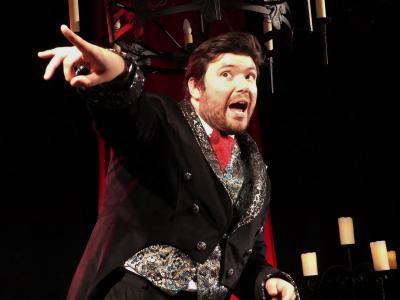
John Hewer works hard. In this comedy approach to ‘Dracula’ he gives us around 18 characters, from Van Helsing to Mina to Harker and all the rest (as well as what seemed to be new inventions), all clearly delineated in their movement, voice, manner. Fast-moving this show is, and there’s no time wasted in changing costume or any part of it: at the start we meet Van Helsing in full Victorian/Gothic fig and though that costume stays the same, we’re never vexed by (say) Mina’s voice coming out of it.
There’s no time wasted, either, in any changes in setting - all that’s there (candles, garlic bulbs, a red drape upstage, ship’s wheel) is made use of as appropriate and the adventure moves along at great pace. Written by Hewer himself, the show was first presented around 18 months ago and Director Bruce Knight keeps it moving in fast and furious manner. There’s a well-crafted set of sounds – designed by Christopher Peters – giving us everything from doors creaking open and shut, typewriter keys and a host of other practicals as well as appropriate music intros: Hewer plays sharply and precisely against them.
It took a few minutes for this reviewer to make the link between Hewer in Dracula, and Hewer as the creator and performer in his much-loved Tommy Cooper tribute (also in Buxton this year in its third visit). The link is that here too there are bad jokes, bad puns, unexpected silliness played out direct to the audience to get and enjoy its reaction and its groans of recognition – sometimes anticipation. In this ‘Dracula’ they come thick and fast, sometimes even un-noticed as we sense we’ve missed a gag. It may be, of course, that such a well-distanced Covaudience didn’t bring the group togetherness which is needed when the actor is teasing us as well as progressing the story.
It’s plain that John Hewer is a devotee of Tommy Cooper: once we notice, it’s impossible to ignore the similarities in style and approach. Indeed, the link is made (some might say underlined and in BOLD CAPITALS) when the actor reaches off stage, brings out and puts in the celebrated red fez. For this reviewer, this was a step too far, un-necessary and lacking in purpose.
Michael Quine
MR FOX - Polis Loizou / The Off-Off-Off-Broadway Company

Lord Leander takes the stage in a sumptuous dressing gown, affronted at being doorstepped by a nosy blogger. He seems keen to talk though. Perhaps he’s lonely? His initial affable manner, punctuated with witty asides which get the audience giggling, morphs into something more uncertain, as he evades the blogger’s questions about Jodi (with an ‘i’).
Just as the audience is wondering how much of an unreliable narrator he is, Lord Leander launches into the gripping tale of Lady Mary and Mr Fox. We are spellbound by the gory tale, expertly told in full colour on a stage with no props other than a cloth-covered box for Lord Leander to sit on. As the tale reaches its dramatic ending, the blogger demands an answer to the modern day mystery of Jodi. Lord Leander isn’t telling.
The blogger wasn’t there, as this is a one-man show written, directed and acted by Polis Loizou, but that didn’t matter as he ably convinced us that he was not only Lord Leander, but also Lady Mary, Mr Fox and occasionally one of Lady Mary’s many brothers. The aristocratic Lady Mary and the alluring Mr Fox have a lot of dialogue. Loizou, in his dressing gown, always makes clear which one is speaking.
Loizou and the Off-Off-Off Broadway Company are regular visitors to Buxton Fringe. This show debuted at the London Horror Festival in 2019, and it is a treat to be able to see it in Buxton after the horrible hiatus that has kept our theatres dark for so long. Loizou was obviously delighted to be back on stage, and the audience was equally pleased to see him in this deliciously dark performance.
Be bold, be bold, and book for one of the three remaining performances. Mr Fox is at Underground at the Old Clubhouse, on Saturday 10 July at 5:30pm, Sunday 11 July at 10pm, and Monday 12 July at 8:30pm.
Georgina Blair
NATHAN & IDA: TEMPUS FUGIT - Nathan & Ida
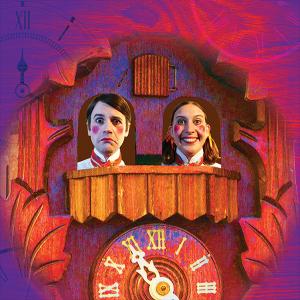
So this is it! Buxton Fringe Festival 2021! Are you as excited as I am to be back watching live theatre?
I'm kicking off my first Fringe show of the year with the brilliant Nathan and Ida: Tempus Fugit.
What can I say other than it is 50 minutes of playful and charming talent with amazing attention to detail and intricacy! The comedy consists of two German wooden characters stuck in a magic cuckoo clock in an ancient abandoned castle in Bavaria. The characters are trapped in their structured routine of performing their dance and songs on the hour and their tasks of polishing the numbers, oiling the cogs and dusting the tracks, under the watchful eye of the cuckoo bird.
But when things start to change in the brother and sister's day to day repetitive regime, how will they cope? Only time will tell...
I highly recommend you watch this captivating and energetic performance, on next 9th July 5:30-6:20pm and 10th July at 4-4:50pm, at the Underground at the Clubhouse.
So, what are you waiting for?! Tick Tock, get your ticket!
Alice Featherstone
TYRANNY ROLLS - JUSTICE FOR ALL - But Why?
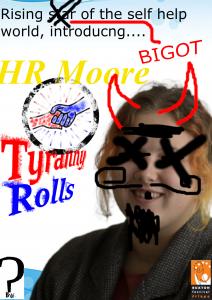
This immersive experience was my first as a reviewer. It really wasn’t what I expected, but I mean that in a good way.
Days before immersing yourself, if that is the correct formulation, you receive several notifications. My innate wary nature, along with my lack of IT know-how, made me nervous about whether anything would work, but all was, on a technical level, exemplary. And bang on cue, I was contacted by the team.
By team, I refer to a creature with an unusual aspect – too much detail would constitute a spoiler. I had to verbally sign up to some conditions, a few of which might have smacked of brainwashing in a more suspicious person. I felt a little unsure as to what I was protesting against, or why. I was then teamed up with another immersee and we were set several tasks. My co-worker was very efficient and always allowed me to have the first go at making suggestions, but I suppose yours might be different. The rest is to follow.
Because, if you are still reading this, you commit yourself to follow-up sessions. It helps to have some free time, a decent internet connection, and a passing acquaintance with IT skills.
But Why? are, in their words, an immersive theatre company who specialise in online storytelling and are inspired by internet mysteries and alternative reality games to find an interesting middle-ground between internet culture and live theatre. This particular show was inspired by Jon Ronson’s 'So you’ve been publicly shamed' alongside the 'cancel culture' that’s permeating the modern political scene. In my words, they have worked incredibly hard to put together this very impressive and quite complicated package.
Find the time, dust down the laptop and headphones and… immerse yourselves!
Ian Hamilton
DRESSING UP DIETRICH - Patricia Hartshorne
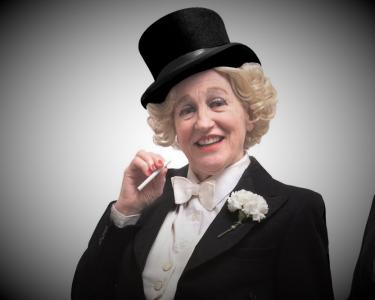
It is a bit like attending a séance in which Patricia is the Medium who causes the apparition of Marlene Dietrich to inhabit a variety of carefully chosen props - amongst them feather boa, wig, evening gown, greycoat, uniform, and of course numerous hats.
In channelling "Lili Marlene" herself, the act is part storytelling, part affectionate tribute and part uncanny impersonation.
Infused within historically accurate facts and anecdotes lie the swagger, stockings and sequins. The diamond-studded story goes from French cabaret Artiste all the way to cross-dressing sexual icon by way of Hitler and Marlene’s thwarting of his advances on behalf of the German cinema-going populace.
Imaginatively sprinkled with classic songs, sung with a gaspy, raspy coo-laden throaty accent as heavy as a sledgehammer, the performance is as entertaining as it is informative.
Iconic and impressive, you’ll get the chance to be “Falling in Love Again” with this Deutsche Diva thanks to this show.
David Carlisle
LEMONS LEMONS LEMONS LEMONS LEMONS by Sam Steiner - Easy Company

This performance was introduced as being the first piece of live theatre to be performed in Buxton for 16 months. Welcome back, Buxton Festival Fringe!
And welcome to Easy Company, a theatre company based in the High Peak in 2011, formed by Robbie Carnegie, Sara Gray and later joined by Alastair Massey. This performance was directed by Robbie and performed by Sara and Alastair.
Two black-clad gloomy figures inhabit a minimalist stage, sparsely lit and with the bare minimum of props – everything from toothbrushes to smartphones have to be imagined – and are part of a gloomy tryst. Bernadette, a lawyer, and Oliver, a musician, are the couple in question.
But what are these numbers, seemingly tossed about as a game of word association? It took me a while to decipher, but please, stick with it.
The government of the day seeks to introduce a ‘Hush Bill’, whereby the number of words pronounced by an individual is strictly restricted. Could any government infringe upon our freedoms in such a manner?
Perhaps more to the point, what is language for? Are words just middle-class things? Can a relationship, problematic as this one is, flourish when it is thus restricted?
Certainly the relationship between the two protagonists is sometimes difficult, and communication remains problematic. The couple are at times pedantic, tetchy and angry (Oliver) and exasperated (Bernadette, accompanied by facial expressions). Fittingly, the tone is varied, with Oliver given to angry outbursts, Bernadette more reflective but also frustrated.
The two actors give a word-perfect and engaging performance – paradoxically, in a play about restricted words containing a considerable amount of lines.
You have to concentrate to work out what is going on, from the numbers to the rather disjointed, short scenes, but this is a thought-provoking well-written play which looks at the nature of language and relationships. There is humour, especially towards the end when the couple attempt to get things of their chest, it is very moving in places, and there is even bathos, as in Oliver’s confession about his behaviour at the demo. Cleverly, it is a play of two halves.
If you can, catch this intelligent show at the same venue on Friday 16th July at 6:45, but remember places are limited!
Ian Hamilton



